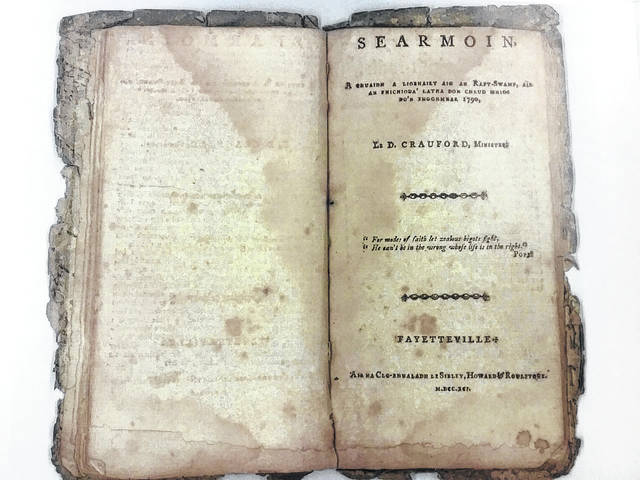For the first time in 228 years, a sermon given by the Rev. Dougald Crawford, will be heard at a church which he founded.
Crawford, a Gaelic-speaking Scottish minister and native of the Island of Arran, served Presbyterian congregations throughout the Scottish settlement of the Upper Cape Fear in the 1780s and 1790s. The sermon being presented, “A Sermon Preached at Raft Swamp,” was printed in Fayetteville in 1791 by the firm of Sibley, Howard and Rowlstone. It is extremely significant in being the first document printed in the Scottish Gaelic language in North America.
Portions of the sermon will be presented in both Gaelic and with English translation at a special event to be held at Old Laurel Hill Presbyterian Church near Laurinburg on Sunday, Oct. 6, as part of the Scotland County Highland Games weekend.
“Crawford served for around 12 or 13 years to congregations ranging from Harnett and Cumberland counties in the north to Scotland and Robeson Counties in the south,” said Bill Caudill, Director of the Scottish Heritage Center at St. Andrews University and Chairman of the Scotland County Highland Games. “Most interestingly, there was a tradition quoted in several books — and by local historians, stating that he returned to Scotland after an unrequited love with a woman from the Barbecue congregation in Harnett County and was lost at sea on the journey back home.
“We now know that this was not the case, and he returned to minister and published other sermons in Scotland prior to his death in 1841,” he added.
One surviving copy of Crawford’s “Sermon Preached at Raft Swamp” survived, and was fortunately scanned for preservation in 2008. The original seems to have disappeared since that time. That disappearance has led several interested parties to pursue ways to preserve and highlight this historic document and its significance.
Many early Presbyterian churches in the Upper Cape Fear region were bilingual – serving both Gaelic and English speakers until well into the 19th century due to the prominence of the Gaelic language spoken by Scottish emigrants and their families. A morning service might be offered in English and an afternoon service offered in Gaelic for those who either could not speak English or preferred to hear sermons in their native language.
“The idea of bilingual church services is something we are now seeing again in our region with the coming of Hispanic and Asian emigrants in the present day, however our history shows us that this phenomena is not a new thing,” Caudill said. “The Upper Cape Fear and Pee Dee regions held the largest population of Gaelic speakers in all of North America – and outside of Scotland itself – until the latter decades of the 19th century, and there is evidence of some use of the language at least as late as the first couple of decades of the 20th century before it completely died out.
“Gaelic was used in more than 30 Presbyterian and a few Baptist and Methodist congregations as well in our region,” he added.
Crawford’s sermons have gained significant attention by scholars and academics in Scotland over the years, and he was a well-revered minister during his time here – enough so to have warranted the publication of some of his works — even printed in a foreign language h ere in North Carolina. Nonetheless, his work is little known now here in the area where he ministered.
Attention to the significance of Crawford’s printed sermons has been overlooked for years. When the document was requested for a display at UNC-Chapel Hill’s Wilson Library in the early spring of 2019, and was discovered missing, it triggered reaction from a number of interested parties. The culmination of that interest has resulted in a first full translation of them into English, and the presentation of segments of the sermon as part of the Scotland County Highland Games weekend.
This special event honoring the Rev. Dougald Crawford and his work will be an entertaining and educational opportunity to learn more about the spiritual life and history of our region and its early settlers.
The presentation will include a brief sketch of Crawford’s life and works, excerpts of Crawford’s sermon and prayers given in the original Gaelic and then presented to the audience in English. The singing of a Psalm in metrical style per the old Scots Presbyterian custom and a question and answer session with the organizers of the event will conclude the event.
Translations of the sermon – dealing with the story of “the prodigal son” — were undertaken by fluent Gaelic speaker and scholar William Cassidy, former president of An Comunn Gaidhealach America (The Gaelic Society of America) with assistance and support by Tiber Falzett, Inaugural Scottish Heritage USA visiting chair of Scottish Gaelic Studies at UNC-Chapel Hill, and John Grimaldi, Gaelic instructor for the New York Caledonian Club. Assisting in research were Robert Currie of Summit, New Jersey, the Rev. Angus Adamson of the Island of Arran, Scotland, and Caudill.
Crawford’s sermon will be re-enacted on Sunday, Oct. 6, at 1:30 p.m. in the sanctuary of the Old Laurel Hill Presbyterian Church, 15301 McFarland Road in Laurinburg. The presentation will immediately follow the Kirkin’ of the Tartans held at the 11 a.m. service, and a covered-dish lunch following that service. The public is invited to attend this historic event. For information, contact info@carolina-highlandgames.com or call 910-318-1397.



